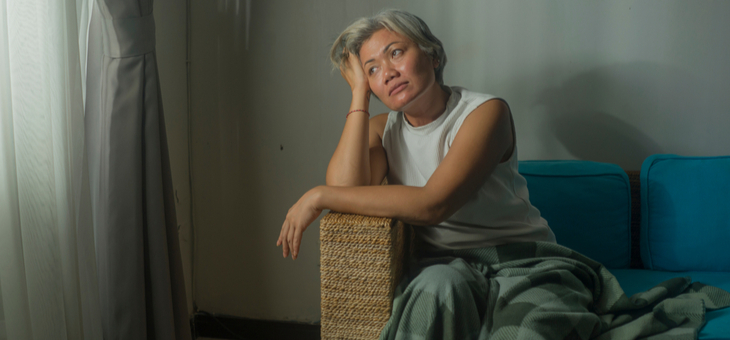The vaccine rollout, mask-wearing, federal government failures and state government grandstanding have all been contentious COVID-19 issues.
But a gambler worth his or her salt would have to bet that lockdowns are the most polarising part of the pandemic.
I’m Victorian, so I know lockdowns. Don’t get me started, NSW, on how hard it’s been on you. Queenslanders have flirted with serious shut-ins, so, too, those in the ACT. But if anyone knows lockdown life, it’s us ‘Infectorians’.
Yes, I hear the nation’s smallest violins playing.
Admittedly, the first lockdown was a bit of a novelty. I was one of the fortunate ones able to work from home and, after acclimatising to the WFH scene, I settled in nicely.
The second one was the big one. I’d moved house in between lockdowns, so I had plenty to do at home. I accepted my fate and got on with it. No drama, really.
Read: Virtual contact for older people during lockdowns worse than none at all: study
The third was much like the second.
Then came lockdown four. Or was it lockdown five? They all just blended in after a while. The past 18 months is now one big blend.
Lockdown six has been the straw for me though. I’m not opposed to lockdowns. I get why we need to have them and I’ve been a good citizen, followed the rules, used the QR codes and worn my mask whenever and wherever I’m supposed to.
But the cracks are starting to appear. I miss my family. I miss a pub meal and my beer gardens. I miss being able to wander through my local sanctuary, up and down High Street or Brunswick Street or any bloody street for that matter.
Window shopping is okay when you have the option of going in. Online shopping sorted out retail cravings for a while, but that’s done its dash, too.
I need people, culture, food when and where I want it. I’d give my toe for a gallery visit or a drive down the coast to see my parents and friends.
Read: Are you developing addictions during lockdown? Watch for these signs
I have been a model of stoicism and stability, but now I’m bloody well over it.
And yet I, like most of you, will keep doing the right thing, burying my frustration and turning it into a nice little ulcer or brain bubble somewhere.
I’m not special, or asking for sympathy. My story is universal.
Almost two-thirds of Australians believe their life has become worse during the pandemic and more than half are feeling more negative about the future.
Compared to when the first wave of infections hit, roughly half now say they are more stressed and more than a quarter say their relationship has become more difficult or strained, according to Australian National University (ANU) analysis.
Co-author of the ANU survey, Professor Matthew Gray, says: “These lockdown blues are impacting on people’s reflections on their own lives.
“Australians are more likely to think that their life had gotten worse, were more likely to say that they felt more negative about the future than they were in May, were more stressed, and more likely to say that their relationship had got more difficult or strained.”
The two-yearly 2021 Australian Institute of Health and Welfare (AIHW) report found that, on average, mental health has a greater impact on life satisfaction than physical health.
The report found that psychological distress was more widespread among younger people than older people, that it worsened between May and August 2020, and remained higher than before the pandemic, driven by worsening rates among women and people aged 75 and over.
Many researchers say the impact of lockdowns on mental health is difficult to gauge, appears to be temporary and is not clearly isolated to residents only in the regions affected.
There has been an increase in calls to crisis lines, says phycologist Dr Michael Bowden, but that trend began decades ago and is seen across many developed countries.
Professor Ian Hickie, from Sydney University’s Brain and Mind Centre, is another who says the problems have been building for decades.
“A dysfunctional system pre-COVID is a system that cannot cope at all with the COVID increases in demand,” he says.
Australian Psychological Society chief executive Zena Burgess says the mental healthcare system is under “unprecedented pressure”.
Lifeline Australia chair John Brogden described the number of calls as extraordinary, adding: “We’ve seen a 32 per cent increase in the number of calls we are receiving in Victoria compared to two years ago.”
ANU Professor Nicholas Biddle says that Australia’s successes early in the pandemic led many people to believe the situation should be far better than it is.
He said Australians were less satisfied with the direction of the country than at any time during the pandemic, less confident in the federal, state and territory governments.
The ANU survey found confidence in state and territory governments had declined from 67.2 per cent of the nation who expressed confidence in April 2021 to 62.1 per cent in August 2021.
Confidence in the federal government dropped from 45.4 per cent in April 2020 to 40.6 per cent by April 2021. Confidence peaked at 60.6 per cent in May 2020.
Disclaimer: Australian readers seeking support and information about anxiety and depression can contact Lifeline on 13 11 14. For more information on treating depression, please visit Beyond Blue.
How much worse is your life since the pandemic? How are you feeling in general? What do you do to feel better? Why not share your thoughts in the comments section below?
If you enjoy our content, don’t keep it to yourself. Share our free eNews with your friends and encourage them to sign up.

